 Roller coasters belong in amusement parks, not on the balance sheet; yet for many specialty fabricator businesses susceptible to seasonal ups and downs, it may sometimes seem as if the operation is being taken for exactly that kind of ride.
Roller coasters belong in amusement parks, not on the balance sheet; yet for many specialty fabricator businesses susceptible to seasonal ups and downs, it may sometimes seem as if the operation is being taken for exactly that kind of ride.
Not every business is prone to periodic slowdowns in work. But for those that are, thanks perhaps to a combination of products offered and location, maintaining a steady income flow can be problematic, requiring some creative thinking. Consider Fairbanks-based Custom Canvas Alaska LLC. When the company first opened in 2005, it focused mainly on providing marine fabric for the river-type boats that were the primary kind of vessel used in that area, says Devlin McKee, co-partner with Eric Walton. In fact, marine jobs comprised about one-third of the business, with the other two-thirds consisting of awnings (which they build from the ground up) and insulated covers for heavy equipment.
Mindful of the short boating season and a relatively small customer base, the pair knew they’d have to add to their professional repertoire. Now, along with their initial offerings, they also make portable shelters, custom bags, RV bras and skirts, side-by-side enclosures for ATVs, outdoor RV seats and covers, and replacement panels for fabric structures. Their service area spread to the North Slope and south down to Valdez. Business from the North Slope comes to them, says McKee, while once a month during the summer, he travels to Valdez, 350 miles away, spending the weekend there working on large boats.
“At this point, we’re about one-quarter marine, one-quarter portable shelters, one-quarter insulated covers and one-quarter other,” says McKee, adding that the company’s objective was to stay profitable and open year-round. Custom Canvas has been able to achieve that goal, keeping its five employees busy, while pulling in a few more in the summer.
Slow-season strategizing
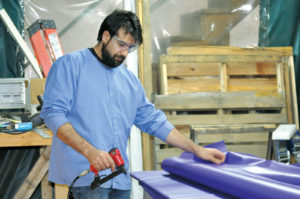
Lars Erickson, director of business development for Special Event Rentals, a full-service tent, wedding and special event rental company headquartered in Edmonton, Alberta, Canada, can attest to the challenges of working in a cold-weather climate. According to Erickson, one of the most effective keep-busy strategies for Special Event Rentals has been building relationships with those requiring rentals year-round, such as caterers, planners and other clients. To build these networks, the company’s sales team attends various shows and industry events, including those hosted by the International Live Events Association (ILEA) and Meeting Professionals International (MPI).
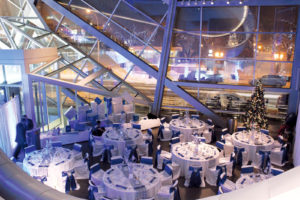
Although in a far sunnier environment, Gary C. Barnes, co-owner with wife Jeri of Tropical J’s Inc. in Honolulu, Hawaii, still has to contend with slack periods. However, the small size of the Hawaiian market has forced Tropical J’s to diversify, so things don’t slow down much.
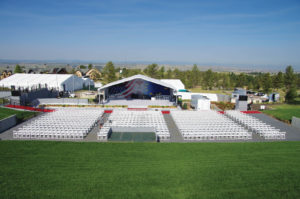
The company designs, manufactures and installs commercial shade products like wood-framed commercial umbrellas, awnings, canopies, four-posted cabanas, beach/chaise cabanas, small tensile structures up to 100 feet and large commercial shade sails. Markets include hotels, condominiums, shopping centers and high-end residential, along with military, federal, state, county and city end users. Tropical J’s also sells other outdoor shade product items that wouldn’t make sense for it to develop and manufacture on its own.
The company, opened in 1989, relies on an outside commissioned salesperson, utilizing its management staff to assist in sales when there’s a job dip. When the work increases, that staff returns to filling orders.
“More than focusing on strategies to increase our sales, we’ve focused on production processes and methodologies to improve our quality, reduce production time and better serve our customers,” says Barnes.
The company has invested heavily in technology, recently purchasing an Eastman® Eagle™ CNC fabric cutter, a large roller-bender, production welding equipment and wire swaging equipment, among others. Tropical J’s also built a custom-designed factory—which it outgrew within three years, Barnes says.
With roots going back to the 1940s, Columbus, Ohio-based Capital City Awning designs, manufactures, installs and services residential and commercial awnings throughout central Ohio; the company also provides awnings nationwide for several retail and restaurant clients, says Timothy Kellogg, president and general manager. It’s not unusual for the awning business to experience slow periods during the winter.
“Our residential clients, for the most part, have little interest in our shade and patio products during this time,” Kellogg says. “And most of our national retail clients build new stores to open in the fall. They don’t open stores in January through March, so there’s much less retail work for us then.”
Kellogg says Capital City Awning copes by managing its cash flow, preserving it during the busy months, which allows the company to meet its fixed costs during leaner times. He hunts for opportunities all year long and adjusts pricing to offer incentives to customers to purchase during the winter rather than waiting until spring.
“We also store awnings for about 1,200 residential customers in the fall, and we provide repairs, cleaning and replacement during the winter months,” Kellogg says. “We encourage projects that will provide work during the winter.”
Purchasing and partnering
Capital City Awning has a sister company, Columbus Canvas Products—soon to change its name to CCP Manufacturing—that sews a wide variety of fabric items for multiple clients, including military, health care and athletic products companies.
“It is not prone to seasonality,” says Kellogg. “At times, CCP will experience a light period between projects, but that’s more random in nature rather than cyclical.”
Having multiple companies in the portfolio is one way to go. It’s worked well for Phoenix, Ariz.-based PRO
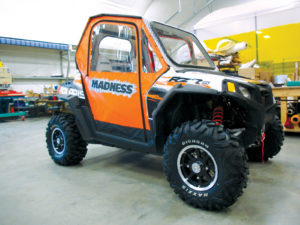
EM Party & Event Rentals, which recently acquired/merged with Partytime-HDO Productions in Chicago and with Universal Resource Supply LLC/SoCal Tents & Events in Los Angeles. These companies provide a wide range of event rental items, including tents, structures, high-end custom structures, furniture, decor, tables, chairs, linens, portable generators, restrooms and other products, says Brady Castro, president and CEO. The company also offers a full array of event services and production, such as security, parking, consulting and event management.
The move has not only brought in more opportunity, it’s given PRO EM Party & Event Rentals the labor force—there are currently 350 full-time employees—to take on more work, Castro says.
“Historically, Phoenix was very prone to seasonal peaks and valleys, which made it very difficult to maintain sufficient trained staff to produce our workload during the event season in Arizona,” he explains. “The Chicago office has this same problem during their opposite seasonality, which was a driving force behind the 2017 acquisition. We can now share labor during each other’s slow seasons.”
When the companies merged, each location’s labor requirements were scrutinized. PRO EM Party & Event Rentals was able to use existing staff throughout the year in the various regions on different projects, allowing the consolidated company to keep its core group busy and also develop new talent.
“Previously, this had been very difficult during the Phoenix summers and the Chicago winters where there were no large outdoor events,” says Castro. “All stores have very complementary inventories, which allows for greater asset utilization and, thus, consistent work for our employees.”
When the Chicago store was acquired, PRO EM sent 12 of its most experienced crew members that June to help out, allowing Chicago to take on more orders. “At that time, Chicago was closed to any new orders due to workload capacity,” says Castro. With the arrival of the Phoenix crew, Chicago could take on more work, generating additional revenue during a time when previously that would have been impossible. The Phoenix crew also headed to Los Angeles that fall to work jobs there.
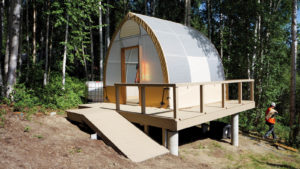
“And in the summer of 2017, the Chicago crews delivered jobs in the Midwest that had been sold by the Phoenix office,” Castro adds. “Our combined personnel, systems and coordinated sales efforts give us the ability to deliver events from the West Coast to the Midwest.”
Forging partnerships can also help mitigate seasonal droughts. For example, Custom Canvas Alaska partnered with a company to make replacement panels for fabric structures. But to do so, the company needed a larger facility. Now, it’s working out of a 6,000-square-foot structure—its previous workspace was about a third this size—that is half tensioned fabric and half insulated panels, provided by that partner and rented by the company.
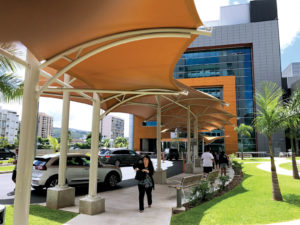
The arrangement has also allowed Custom Canvas Alaska to expand its season. Prior to moving into the structure about 10 years ago, much of the work took place outside. Now the team is able to pull the boats and other vehicles indoors, greatly speeding up the projects and getting the boats back on the water faster.
Tropical J’s has established a number of partnerships that have helped the company avoid excessive slowdowns, including relationships with suppliers, developers, contractors and architects. According to Barnes, partnering with architects has proven its most lucrative source of work.
Pamela Mills-Senn is a freelance writer based in Long Beach, Calif.
"Your employees will work with greater confidence and pride if they know their job is secure. And they will take better care of your customers. This is so valuable that anything you can do to create meaningful work for them during the [slow season] is well worth the effort.”
Timothy Kellogg
president and general manager, Capital City Awning
"We did an all-company summit where we brought staff and managers from all locations together for team building and discussion of our sales processes as a consolidated organization. It removed some of the fear and uncertainty that sometimes comes with mergers and acquisitions.”
Brady Castro
president/CEO, PRO EM Party & Event Rentals
"Our biggest challenge was learning our market. Big-box retail stores forever changed the concept of quality and competition. Real estate and labor costs have forced most of the old small awning companies serving the general residential customer out of business. Living costs and big-box stores have eliminated the vast majority of residential customers from the low-end awning market. Accordingly, we aimed our focus on high-end commercial projects, providing services others could not.”
Gary C. Barnes
co-owner, Tropical J’s Inc.
 TEXTILES.ORG
TEXTILES.ORG


